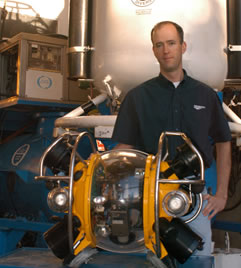 Divecon Services is a subsea services contractor based in Oxnard, California whose work includes civil construction, coring operations, diving and ROV operations, fiber optic cable route surveys, marine construction, seismic retrofit projects, subsea pipeline installation/repair, and subsea salvage. The company’s customers come from the oil and gas, telecommunications, and entertainment industries; port authorities; government agencies; and engineering and scientific firms.
Divecon Services is a subsea services contractor based in Oxnard, California whose work includes civil construction, coring operations, diving and ROV operations, fiber optic cable route surveys, marine construction, seismic retrofit projects, subsea pipeline installation/repair, and subsea salvage. The company’s customers come from the oil and gas, telecommunications, and entertainment industries; port authorities; government agencies; and engineering and scientific firms.
Jeff Kowalishen works as a technical systems manager for Divecon. “Because we’re a small company, we all wear several hats,” he says. His main responsibilities are for the ROV systems (monitoring equipment and supplies, preparing the ROVs for assignments, securing the necessary personnel), but he also manages the company’s drug and alcohol program, training, and purchasing.
"Overall, my most valuable training was more about knowing what you’re not supposed to do, so the ROV doesn’t get destroyed – it’s a lot of judgment"
Kowalishen came to the underwater field from aerospace. “The two fields are close; they share the same problems – it’s just that the pressure’s opposite,” he points out. After high school, he worked as an aircraft mechanic in the air force and then for McDonnell Douglas. When the aerospace industry slowed, he attended the commercial diving program at Santa Barbara City College to train for a new career. Although he studied commercial diving there, with his strong electronics background after graduation he found himself working with ROVs for Oceaneering International. “Although I haven’t used that commercial diving training specifically, what I learned has come in very handy,” he explains.
As for learning about ROVs, “most of that has been on-the-job,” he reports. “Overall, my most valuable training was more about knowing what you’re not supposed to do, so the ROV doesn’t get destroyed – it’s a lot of judgment,” he explains. “Anyone can fly an ROV, but not anyone can say ‘that’s a stupid thing to do’.”
Kowalishen believes the most important skills for ROV work are imagination (figuring out how to make something work) and electronics. “Coming up with solutions to problems is really important,” he stresses. “There’s no ROV hardware store you can go to. Many times you have to design tooling on your own.”
"We don’t just have ROV pilots, for example; our pilots are also mechanical or electrical technicians"
Just as he wears several hats, so do his colleagues. “In a big company like Oceaneering, positions are typically more specialized,” he explains. “But everywhere else, people tend to do more than one job. We don’t just have ROV pilots, for example; our pilots are also mechanical or electrical technicians.”
Kowalishen’s advice for people thinking about getting into the ROV industry is to get solid experience in electronics – and then keep learning. “I still don’t have enough electronics – I never have enough, it changes so quickly,” he says.
Also, he advises researching the market. “Different regions have different opportunities,” he points out. “For example, the Gulf of Mexico (with thousands of oil platforms) has more opportunities, so general marine technicians can find work there. On the West Coast, however (where there are just twenty-three platforms and correspondingly fewer available positions), job seekers have to have commercial diving or some other skill as well. Because the work is limited, we need to hire people who can do dual roles.”
<< Back to Profiles Start Page
|
|
